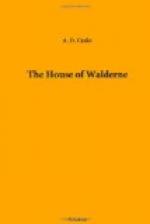And the impending events had roused up the old martial spirit—the half-forgotten life of the camp came back to him, and with it the thought of the boy who would have yearned to distinguish himself on the morrow, had he been there: the light hearted, pugnacious, thoughtless, but loving Hubert.
And while he mused, the door opened, and the prior entered. It was Prior Foville—he who built the two great western towers of the church.
“Stay without,” whispered the prior to someone by his side; “joy sometimes kills.”
The old monk gazed upon the prior with wonder, his face had so strange an expression. It was like the face of one who has a secret to tell and can hardly keep it in.
“What is it, my father? Hast thou brought joy or sorrow with thee?”
“Joy, I trust. We have reason to think thy gallant son is not dead.”
The father trembled. He could hardly stand.
“I know he is alive, but where?”
“On his way home.”
“Nay!”
“And in England!”
“Father, I am here.”
Hubert could restrain himself no longer.
The old man gazed wildly upon him, then threw his arms around his recovered boy, and raising his eyes to heaven, murmured:
“Father I thank Thee, for this my son was dead, and is alive again; was lost, and is found.”
Chapter 25: The Battle Of Lewes.
The barons, on their side, prepared with sober earnestness for the struggle. They were not fighting for personal aggrandisement, but, as an old writer says, “they had in all things one faith and one will—love of God and their neighbour.” So unanimous were they in their brotherly love, that they did not fear to die for their country.
It was the dead of night, and a horseman rode towards the village of Fletching. He was armed cap-a-pie, like one who might have to force his way against odds. His armour was dark, and he bore but one cognisance on his shield, the Cross. He was quite alone, but he knew that farther along he should find a sleeping host. The stars shone brightly above him, the country lay buried in sleep, scarcely a light twinkled throughout the expanse.
The sound of a deep bell tolling the hour of midnight reached him. It was from the priory which he had left an hour or more previously.
“Ere that hour strike again, England’s fate will have been decided,” he said, as if to himself, “and perhaps my account with God and man summed up before His bar. Well, I have a good cause, and a clear conscience, and I can leave it in God’s hands.”
And soon from the crest of a low hill he looked down upon the camp of the barons. There were many lights, and the murmur of voices arose.
Just then came the stern challenge.
“Who goes there?”
“A crusader, who as a knight received his spurs from Earl Simon, and now comes to fight by his side to the death for the liberties of England.”




